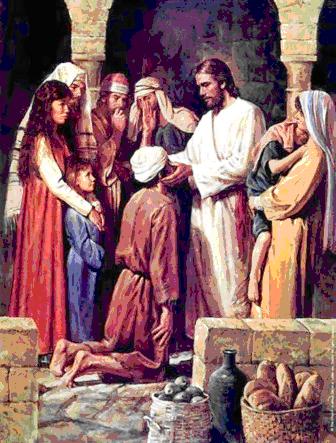
Temple Court
Overpowered with terror, the priests and rulers had fled from the temple court, and from the searching glance that read their hearts. In their flight they met others on their way to the temple, and bade them turn back, telling them what they had seen and heard. Christ looked upon the fleeing men with yearning pity for their fear, and their ignorance of what constituted true worship. In this scene He saw symbolized the dispersion of the whole Jewish nation for their wickedness and impenitence.
And why did the priests flee from the temple? Why did they not stand their ground? He who commanded them to go was a carpenter's son, a poor Galilean, without earthly rank or power. Why did they not resist Him? Why did they leave the gain so ill acquired, and flee at the command of One whose outward appearance was so humble?
Christ spoke with the authority of a king, and in His appearance, and in the tones of His voice, there was that which they had no power to resist. At the word of command they realized, as they had never realized before, their true position as hypocrites and robbers. When divinity flashed through humanity, not only did they see indignation on Christ's countenance; they realized the import of His words. They felt as if before the throne of the eternal Judge, with their sentence passed on them for time and for eternity. For a time they were convinced that Christ was a prophet; and many believed Him to be the Messiah. The Holy Spirit flashed into their minds the utterances of the prophets concerning Christ. Would they yield to this conviction?
Repent they would not. They knew that Christ's sympathy for the poor had been aroused. They knew that they had been guilty of extortion in their dealings with the people. Because Christ discerned their thoughts they hated Him. His public rebuke was humiliating to their pride, and they were jealous of His growing influence with the people. They determined to challenge Him as to the power by which He had driven them forth, and who gave Him this power.
Slowly and thoughtfully, but with hate in their hearts, they returned to the temple. But what a change had taken place during their absence!
When they fled, the poor remained behind; and these were now looking to Jesus, whose countenance expressed His love and sympathy. With tears in His eyes, He said to the trembling ones around Him: Fear not; I will deliver thee, and thou shalt glorify Me. For this cause came I into the world.
The people pressed into Christ's presence with urgent, pitiful appeals: Master, bless me. His ear heard every cry. With pity exceeding that of a tender mother He bent over the suffering little ones. All received attention. Everyone was healed of whatever disease he had. The dumb opened their lips in praise; the blind beheld the face of their Restorer. The hearts of the sufferers were made glad.
As the priests and temple officials witnessed this great work, what a revelation to them were the sounds that fell on their ears! The people were relating the story of the pain they had suffered, of their disappointed hopes, of painful days and sleepless nights. When the last spark of hope seemed to be dead, Christ had healed them. The burden was so heavy, one said; but I have found a helper. He is the Christ of God, and I will devote my life to His service. Parents said to their children, He has saved your life; lift up your voice and praise Him. The voices of children and youth, fathers and mothers, friends and spectators, blended in thanksgiving and praise. Hope and gladness filled their hearts. Peace came to their minds. They were restored soul and body, and they returned home, proclaiming everywhere the matchless love of Jesus.
At the crucifixion of Christ, those who had thus been healed did not join with the rabble throng in crying, "Crucify Him, crucify Him." Their sympathies were with Jesus; for they had felt His great sympathy and wonderful power. They knew Him to be their Saviour; for He had given them health of body and soul. They listened to the preaching of the apostles, and the entrance of God's word into their hearts gave them understanding. They became agents of God's mercy, and instruments of His salvation.
The crowd that had fled from the temple court after a time slowly drifted back. They had partially recovered from the panic that had seized them, but their faces expressed irresolution and timidity. They looked with amazement on the works of Jesus, and were convicted that in Him the prophecies concerning the Messiah were fulfilled. The sin of the desecration of the temple rested, in a great degree, upon the priests. It was by their arrangement that the court had been turned into a market place. The people were comparatively innocent.
DA 162-164